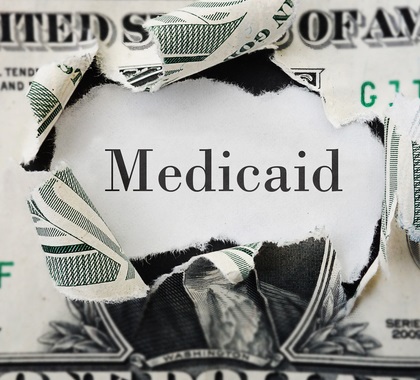Although several states have experimented with different ways to expand their Medicaid programs, the result has been all too familiar: huge cost overruns.
In April, legislation was introduced in Alaska that would reform the Last Frontier’s fledgling Medicaid expansion program.
In 2015, Alaska Gov. Bill Walker decided to expand its Medicaid program under provisions in the Affordable Care Act (ACA). To date, the results have been less than stellar. The total enrollment and cost per person for Alaska’s Medicaid expansion have been much higher than initial estimates. In 2017, Alaska’s total Medicaid expansion population was more than 35,000 adults, far above the 23,273 estimate made prior to expansion. Even worse, the cost per Medicaid expansion enrollee was a whopping $10,500, about $3,000 above the original estimate. At the end of 2017, Alaska’s cost overruns for its Medicaid expansion population totaled $200 million.
Under the legislation now under consideration in Alaska, thousands of Alaskans covered under its expanded Medicaid program would be shifted to subsidized private insurance plans. This Medicaid expansion alternative, known as the “private-option” model, was first enacted in Arkansas in 2013. Under Arkansas’ “premium assistance” model, an estimated 300,000 new enrollees were added to the Natural State’s Medicaid rolls. These new enrollees (unlike previous Medicaid expansion enrollees) were able to purchase private insurance from the state’s ACA insurance exchange while receiving a premium-support payment to purchase the insurance.
Despite the private-market veneer, the Arkansas model has not solved the biggest problem of Medicaid expansion: It remains completely unaffordable. In fact, the public option did not create any savings for Arkansas (or federal) taxpayers. The private option model was 98 percent more costly than traditional expansion, according to a 2018 study by the Arkansas Center for Health Improvement.
Additionally, enrollees using the private-option cost Arkansas taxpayers around $7,000 per person in 2018, much more than the costs associated with enrollees under the standard fee-for-service model, which cost about $5,300 per person, according to the Arkansas Division of Medical Services.
Adding insult to injury, premiums in Arkansas’ individual market have also risen since the state implemented Medicaid expansion. Arkansas’ health insurance premiums have more than doubled since expansion, rising at a rate that’s 22 percent higher than the national average, according to the Office of the Assistant Secretary for Planning and Evaluation. To put this in better perspective, Arkansas had the third lowest health insurance premiums as recently as 2013—just before its misguided Medicaid expansion program.
With its pseudo-privatized Medicaid expansion failing to contain skyrocketing costs, Arkansas became the first state to consider reforms that would scale back its Medicaid expansion in 2017.
Although no state has successfully repealed Medicaid expansion, the Natural State’s expansion efforts show Medicaid expansion is not sustainable over the long term, and the private-option plan is not a viable solution. Alaska should learn from Arkansas’ mistakes.
Medicaid reform efforts should focus on encouraging able-bodied recipients to become more self-sufficient and less dependent on government aid. Fortunately, the Trump administration is encouraging states to enact such reforms.
To date, several states have been granted waivers by the federal government. So far, these innovative reforms have primarily included work requirements. Other possibilities could include the implementation of payment enforcement mechanisms to encourage cost-sharing, such as co-pays; allowing states to deploy incentives for enrollees to engage in healthy behaviors; placing time limits on coverage; and monthly income verification and eligibility renewals.
The following documents examine Medicaid reform and expansion in greater detail.
The Hard Truth About Medicaid Expansion
http://alaskapolicyforum.org/2019/02/the-hard-truth-about-medicaid-expansion/
The Alaska Policy Forum examines how Medicaid expansion is failing in Alaska and recommends how the state can improve its Medicaid program through reforms such as work requirements.
Evidence Is Mounting: The Affordable Care Act Has Worsened Medicaid’s Structural Problems
https://heartland.org/publications-resources/publications/evidence-is-mounting-the-affordable-care-act-has-worsened-medicaids-structural-problems
In this Mercatus Center paper, Brian Blase examines the effect of the Affordable Care Act on Medicaid. Blase’s findings reveal Medicaid expansion has worsened many of the structural problems in the program.
Work Requirements Are Working for Kansas Families: How Welfare Reform Increases Incomes and Improves Lives
https://thefga.org/wp-content/uploads/2017/07/Work-Requirements-are-Working-for-Kansas-Families.pdf
In this study, Nic Horton and Jonathan Ingram of the Foundation for Government Accountability examine Kansas’ welfare reforms and how recipients fared after leaving the program.
Don’t Wait for Congress to Fix Health Care
https://heartland.org/publications-resources/publications/dont-wait-for-congress-to-fix-health-care
In this Policy Brief, Heartland Senior Policy Analyst Matthew Glans documents the failure of Medicaid to deliver quality care to the nation’s poor and disabled, even as it drives health care spending to unsustainable heights.
The Arizona Medicaid Expansion Experience: Beware the Peddlers of Cost-Shifting Claims
https://goldwaterinstitute.org/wp-content/uploads/2018/08/ArizonaMedicaidExperience_FINAL.pdf
This study, written by Naomi Lopez Bauman, Angela Erickson, and Christina Sandefur examines the effects of Medicaid expansion on health care costs and whether it has cut down on the high cost-sharing borne by the insured.
Nothing in this Research & Commentary is intended to influence the passage of legislation, and it does not necessarily represent the views of The Heartland Institute. For further information on this subject, visit Health Care News, The Heartland Institute’s website, and PolicyBot, Heartland’s free online research database.
The Heartland Institute can send an expert to your state to testify or brief your caucus; host an event in your state, or send you further information on a topic. Please don’t hesitate to contact us if we can be of assistance! If you have any questions or comments, contact Lindsey Stroud, a state government relations manager at The Heartland Institute, at [email protected] or 312/377-4000.




